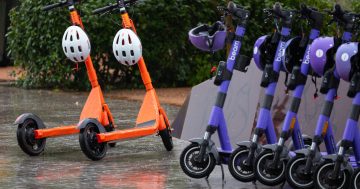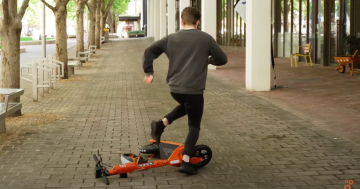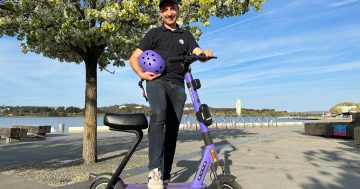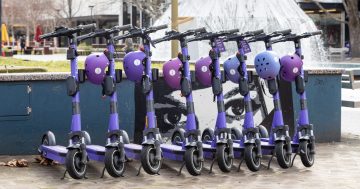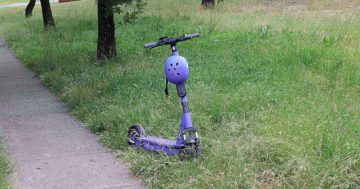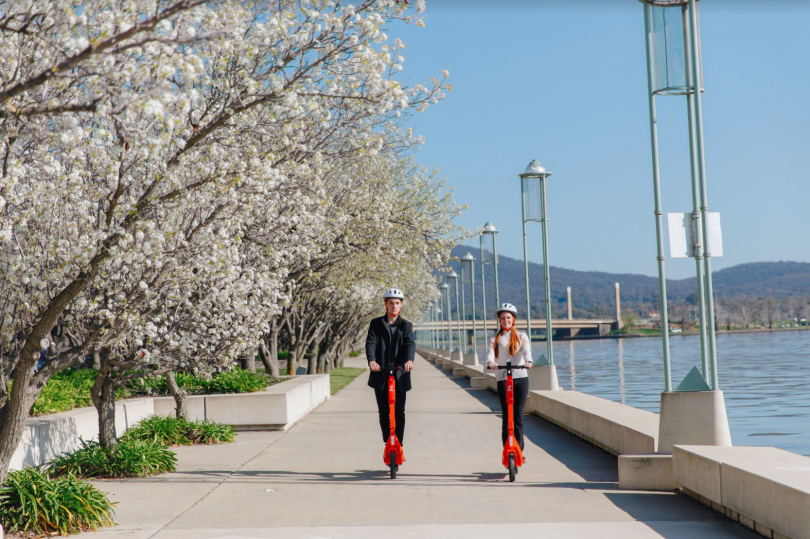
Canberrans particularly enjoy riding around the smooth pavements around Lake Burley Griffin. Photo: Supplied.
Neuron Mobility has announced their fleet of orange e-scooters have clocked up 1 million kilometres since their introduction in Canberra in September last year.
To put that into perspective, we’ve crunched some numbers.
The bridge-to-bridge walk around Lake Burley Griffin is around 5 km, meaning you’d have to scoot it about 200,000 times to clock up the magic million.
If you’re travelling at 15 km/h (the speed limit around the lake), it’d take around 13,000 hours, or more than 541 days of non-stop scootering (not counting charge times).
According to new data from Neuron, 1 million scooter kilometres means 72 tonnes of CO2 have been eliminated as 42 per cent of these trips replaced a car journey.
Clearly, Canberra is car-mad, but the e-scooters are designed to replace the so-called ‘last mile’ trips, linking parking or public transport to final destinations and vice versa.
On average, Canberrans ride 2.2 kilometres, and 13 per cent of these trips would not have happened at all had it not been for the easy availability of the e-scooters.
Neuron stresses the positive impact the introduction of the e-scooters has had on the capital, saying 64 per cent of all rides resulted in a purchase from a business.
Neuron Mobility CEO Zachary Wang said the company was “thrilled to have reached 1 million kilometres in Canberra after only a few months of operation”.
Minister for Transport and City Services Chris Steel said data from both companies shows the e-scooters are attracting more than 4000 trips per day.
The single-day record for rides to date was on Saturday 21 November last year when passengers clocked up 9325 trips. Mostly, the e-scooters are used for short trips, with a median length of 8 minutes per ride recorded. They are also much more popular in the afternoons and evenings, and especially for linking inner north suburbs like Turner and O’Connor with Braddon and the city.
Neuron say they have received overwhelmingly positive feedback from riders about the service.
Despite repeated reports of vandalism, accidents and community concerns over the dangers they pose to pedestrians and riders, as well as the landscape, e-scooters remain a popular travel option for locals and visitors alike.
During the almost eight months the e-scooters have been a feature in the capital, Neuron and its competitor Beam have run campaigns to teach locals about riding safely and correctly.
Unfortunately, that hasn’t stopped a spate of accidents, nor the issuing of police fines.
But Neuron says such cases are rare and that the vast majority of riders are behaving responsibly.
“We take safety very seriously, and while it is not possible to eliminate incidents entirely, we strive to reduce the risks as much as possible,” Mr Wang said.
Neuron has also partnered with the Australian Road Safety Foundation and will launch a new safety campaign in Canberra soon.
E-scooter riders are obliged to obey ACT traffic laws at all times, must wear a helmet and not be under the influence of either alcohol or drugs while riding.
Only one user is permitted per scooter, and neither provider allows users under the age of 18 to ride.
The ACT Government is currently undertaking a survey in order to further examine how e-scooters are being used and if any changes need to be made to the current scheme.
The e-scooter survey is available from the Transport Canberra website until Friday 23 April 2021.












